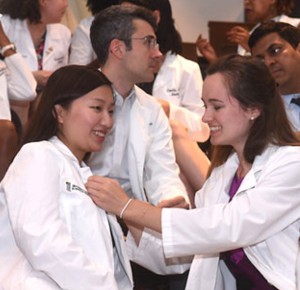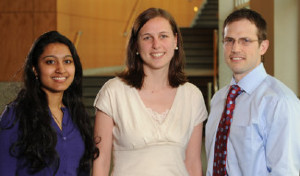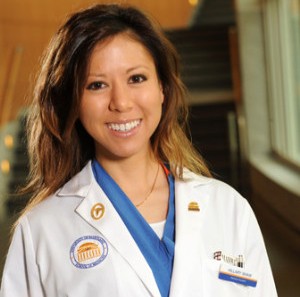
Everyone’s journey to medicine is unique. This is a beautiful, demanding, challenging and rewarding field. Having genuine motivation for the work is so important — your patient’s life will depend on it.
As you explore medicine as a career possibility, make sure you ask for help from trusted sources along the way. Close, frequent communication with your premedical advisor is very important. If you do not have a premed advisor at your institution, the National Association of Advisors for the Health Professions (NAAHP) can help you find one.
*If a date falls on a holiday or weekend, the next business day applies.
All applications to the University of Maryland School of Medicine must be initiated through the American Medical College Application Service (AMCAS).

Your AMCAS application is the first of a two-stage process and must be on file with AMCAS by the November 1 deadline. Applications are accepted from citizens and permanent residents of the United States and citizens of Canada only. All AMCAS applicants are invited to submit a University of Maryland School of Medicine secondary application after the AMCAS application is received.
The deadline for the receipt of the secondary application is December 1. In situations where the secondary application is sent to an applicant after the December 1 deadline, the applicant will have two weeks to return the application to the School of Medicine. The secondary application fee of $80 is non-refundable.
It is strongly recommended that the application forms, letters of recommendation and all other supporting credentials be filed as early as is possible in the application period. An extension of the November 1 deadline is unusual and will be granted only under the most extenuating of circumstances.
Early Decision Applications to UMSOM must be on file with AMCAS by the August 1 deadline. All Early Decision applicants will be notified of a decision on their application by October 1.
Applicants will be able to complete their secondary application, upload supplemental documents, schedule their interview, conduct their interviews, and receive their Admissions decisions on the Application Portal (AMP).
Once our office has received your verified AMCAS application, a secondary application invite email will be sent to the email address listed on your application. (If you have a Gmail account, be sure to check the junk/spam folder.)
For all candidates not applying Early Decision, the application process is conducted on a rolling basis. All decisions regarding the selection process are made by a committee of current faculty and students. Each applicant’s credentials are evaluated by the Committee on Admissions to determine if an interview is to be granted.
All interviews are conducted at the School of Medicine and are scheduled in advance by invitation only. Interviews are conducted each week, on Mondays and Wednesdays, from September to early February. Applications may be rejected from both residents and nonresidents without an interview.
Those applicants invited to interview will receive, in writing, one of three decisions from the Committee on Admissions:
Students may write to the Office of Admissions at any time during the application process if there are significant concerns or questions regarding the status of their application.
A deferment of matriculation for one year may be granted to accepted applicants who present such a request in writing to the Committee on Admissions by June 1. An individual making such a request must present a plan of activity for the coming year that is both focused and productive in nature.
An individual who is granted a deferment must re-apply through the Delayed/Deferred Program at AMCAS, and can apply only to the University of Maryland, to secure their seat for the following year. All policies and procedures for Early Decision will apply.
Applicants who are accepted from the Waitlist are not eligible for deferment.
The medical school application process can be a stressful time for all concerned. We respectfully request that applicants keep phone calls, letters or emails to the Office of Admissions to a minimum. Each applicant must assume responsibility for assuring that all required materials and the completed application packet are filed and received by the Committee on Admissions.
If you have a question or concern about the status of your application, please contact the office to clarify your status. The Office of Admissions will make every effort to assist with the completion of your application, within reason.
All applicants are expected to respond truthfully and completely to all questions on the AMCAS and School of Medicine application forms. An applicant who provides false or misleading information during the application process will be denied admission or, if enrolled before discovery of irregularity in the application process, may be dismissed from school.

Every applicant who submits an AMCAS application to the University of Maryland School of Medicine receives a Secondary Application. The purpose of our secondary application is to better understand our applicants and their commitment to becoming a physician.
Our optional questions help us understand more clearly how our applicants’ backgrounds and lived experiences contribute to the rich diversity of our class and the profession. We also include a question that allows you to explain any academic challenges you have experienced.
These short essay questions allow us to better understand you and your commitment to a career in medicine:
Letters of recommendation are as important in the selection process as the applicant's academic credentials and MCAT scores, extracurricular activities, and essays. Applicants to the School of Medicine should seek out letters of recommendation from individuals who have both personal knowledge of the applicant's accomplishments and the insight to objectively assess the applicant's character, work ethic and motivation for a career in medicine.
Members of the Committee on Admissions give little or no weight in the selection process to subjective recommendations from friends, family members and political figures.
If an applicant has significant employment or military experience before, during or after college, then letters from employers, supervisors and commanding officers are appropriate as well.
If you are reapplying to the School of Medicine, the Committee on Admissions highly recommends that you submit updated letters of recommendation. In addition, you should also submit letters from experiences undertaken since your previous application.
Please remember that it is your responsibility to be sure that the above requirements are met. You are also responsible for requesting your letters of recommendation so that they are received by our deadline of January 15.
If you are applying as an Early Decision candidate, your letters of recommendation must be received by August 31.
Applications that continue to miss letters of recommendation will be considered incomplete when they are reviewed by the Committee on Admissions. This will have a direct impact on the disposition of your application.

The successful University of Maryland School of Medicine applicant optimizes their undergraduate and graduate education experiences by exploring personal areas of academic interest and life passions through curricular and extracurricular activities. Ultimately, the rigor of a student’s education along with their life experiences and maturity mark readiness for medical education. In addition to the academic requirements detailed below, we seek candidates who evidence the following characteristics:
A career in medicine offers opportunities to those talented in both humanities and the sciences. Therefore, there are no specific majors necessary for success. We prefer you think of our curricular prerequisites as competencies, which must be achieved prior to medical school, and not as specific course requirements. We encourage you to familiarize yourself with the AAMC Core Competencies for Entering Medical Students, including the curricular and extracurricular competencies listed, as we believe that strength in these areas will prepare you well for medical school, and for a career in medicine beyond.
The purpose of our listed curricular prerequisites is to provide guidance on strategies for academic preparation for medical school and to identify who will excel in achieving the AAMC core competencies and ultimately be successful in our rigorous academic program. Prerequisite coursework must be completed at an accredited institution recognized by the Council of Higher Education Accreditation, and may be completed as Advanced Placement (AP) or International Baccalaureate (IB) credit, at a community college, and/or online.
Students entering college with a strong background in the sciences, as demonstrated by advanced placement, are encouraged to substitute advanced science courses for the traditional requirements listed below. The Committee on Admissions recommends that pre-requisite coursework be completed within five years of when an applicant submits their application.
These courses are not required, but we believe they will help strengthen the academic preparation of future medical students for success in our medical education curriculum:
The courses you choose to fulfill our prerequisites should demonstrate your commitment to achieve the AAMC Core Competencies. The AAMC Core Competencies for Entering Medical Students also offers additional information. If you are unsure whether your coursework corresponds with our prerequisites, please see additional information about each competency area below.
Intellectual engagement in the field of biology, which will include coursework and laboratory experience, that encompasses the core concepts of cell and developmental biology, molecular biology and genetics. These core concepts include:
Intellectual engagement in the field of chemistry, which will include coursework and laboratory experience, that encompasses core concepts of biochemistry and biologically applicable elements of inorganic and organic chemistry. These core concepts include:
Ability to clearly demonstrate knowledge of basic physical principles and their applications to the study and understanding of living systems is required. These core concepts include:
Ability to effectively communicate to convey information or a message clearly through written communication. Experience with oral presentations is also highly valued. *For writing-intensive coursework, the writing assignments should be 50% or more of the final grade.
Clinical experience refers to experiences in which you are exposed to the health care field.

The University of Maryland School of Medicine considers for admission students who are citizens or permanent residents of the United States, DACA students in the State of Maryland eligible for Maryland State Financial Aid, or citizens of Canada. Students in the process of applying for permanent resident (PR) status are welcome to apply to the University of Maryland School of Medicine. Their application will be reviewed only after they have obtained their green card. It is the responsibility of the applicant to contact the Office of Admissions to notify us of their updated visa status and provide appropriate confirming documentation.
As a state-assisted medical school, the University of Maryland gives preference in the selection process to residents of Maryland. However, a significant number of non-resident applicants are invited to interview and accepted to enter each freshman class.
The School of Medicine welcomes applications from individuals who reside throughout the United States and Canada. Diversity is highly valued in the educational process and applications are encouraged from individuals from nontraditional and disadvantaged backgrounds.
The University of Maryland School of Medicine does not discriminate on the basis of race, ethnicity, national origin, religion, gender or gender identity, sexual orientation, marital status, protected veteran's status, physical or mental disability, or age in its selection process. The University of Maryland, Baltimore also prohibits sex discrimination in any education program or activity that it operates. Individuals may report concerns or questions to the Title IX Coordinator. Read the UMB Notice of Non-Discrimination for more information.
The decisions of the Committee on Admissions are based on several criteria. These criteria have been developed by the faculty of the School of Medicine and are closely allied to the school's academic mission and goals. The School of Medicine will admit only those individuals who have documented that they possess the ability to successfully complete the academically rigorous curriculum and the personal characteristics that we would all like to see in our own physicians.
Academic excellence is expected. However, acceptance is not guaranteed on the basis of excellent grades and MCAT scores alone. Each application undergoes a thorough holistic review. The Committee on Admissions seeks out evidence for the following qualities in the applicant's personal statement, in their extracurricular activities and life experiences, and in letters of recommendation from premedical advisors and others who know the applicant well:
Applicants should use the Personal Comments section of the AMCAS application to discuss selected extracurricular activities and life experiences, and the relevance of each in their decision to pursue a medical career. There are no prescriptive activities that will guarantee acceptance to our medical school. Each applicant is encouraged to pursue activities that will demonstrate their special talents and which will support their motivation for a career in medicine.
Exposure to clinical medicine, and knowledge of the advantages and disadvantages of medicine as a career, are expected. Research experience and community service are highly valued by the Committee on Admissions. Activities pursued for fun and relaxation are important. Students should pursue activities that they find to be personally fulfilling and enjoyable. The quality, rather than quantity, of these experiences should be emphasized.
Applications may be rejected from both residents and non-residents without an interview. Those applicants who possess competitive academic records and the personal characteristics noted above may be invited to interview. The interview provides the candidate with an opportunity to discuss their personal history and motivation for a medical career and any aspect of their application that merits special attention or explanation. Candidates should be prepared to discuss any and all aspects of their application.
Interviewers are trained to specifically evaluate an applicant's maturity, adequacy of support systems, level of confidence in their abilities, intellectual curiosity, communication skills, motivation for medicine, depth of involvement in extracurricular activities, and professional bearing during the interview, among other factors. Applicants are expected to possess excellent communication skills, to be enthusiastic and knowledgeable about a career in medicine and to conduct themselves in an appropriate fashion during the interview.
The interview evaluations are the last important factor considered by the members of the Committee on Admissions in their deliberations regarding each applicant's candidacy for admission.

The University of Maryland School of Medicine has an Early Decision Program for applicants who are sure that their first choice of medical schools is the University of Maryland. The Committee on Admissions interviews selected Early Decision applicants and makes a decision on these students before considering the regular pool of applicants.
By applying for Early Decision, the highly qualified applicant avoids having to make numerous other applications. Applicants with less competitive academic credentials, or those without the support of their premedical advisor, are discouraged from applying through this program.
The Early Decision applicant must apply only to this school by the AMCAS deadline of August 1. That means you must submit your application and all transcripts by August 1.
Applicants must provide all supplementary information (secondary application, updated MCAT scores, and letters of recommendation) by August 31.
Interviews will take place at the medical school in mid-September. No one will be accepted without an interview. If offered an acceptance by this school, the applicant cannot apply elsewhere. All decisions for this program are made by October 1.
The Committee on Admissions can make one of three decisions for each Early Decision applicant:
Each applicant will be notified promptly of the decision of the Committee on Admissions so that those not accepted through this program can apply elsewhere.
Individuals who apply through the Early Decision Program cannot apply to any other medical school until they are notified that they have not been accepted through this program at the University of Maryland School of Medicine.
The mission of the University of Maryland School of Medicine Doctor of Medicine (MD) program is to provide an inclusive learning environment that develops lifelong learners who are clinically excellent and possess humanism, professionalism, scholarship, leadership, critical thinking and attention to social justice and diversity. The University of Maryland School of Medicine is committed to the full and equitable inclusion and support of qualified learners with disabilities.
It is the responsibility of the faculty to select matriculants who are best qualified to successfully complete the required training and develop into skilled, effective, and compassionate physicians that will fulfill the mission of the School. Applicants and matriculated students will be judged not only on their scholastic achievement and abilities, but also on their intellectual, physical, emotional, and ethical capacities to meet the essential requirements of the school’s curriculum. The School of Medicine will consider for admission those individuals who possess the ability to successfully complete the academically rigorous curriculum and the personal characteristics embodied by exemplary physicians. These are guided by the AAMC Core Competencies for Entering Medical Students.
The Office of Admissions hosts virtual interview days on Mondays and Wednesdays from mid-September through the end of February. Once you receive an "invitation to interview" email, you will find more details about your interview day on the application portal.
Here is a basic outline of what you can expect on your interview day.
| Schedule | Time |
| Welcome | 11:15 a.m. (ET) |
| Q & A with Associate or Assistant Dean | 11:30 a.m. |
| Lunch with Medical Students | 12:15 p.m. |
| Campus Tour with Senior Students | 1 p.m. |
| BREAK | 1:45 - 2 p.m. |
| Possible Interviews | 2 p.m. 3 p.m. 4 p.m. |